|
Books Should Be Free Loyal Books Free Public Domain Audiobooks & eBook Downloads |
|
|
Books Should Be Free Loyal Books Free Public Domain Audiobooks & eBook Downloads |
|
Humorous Books |
|---|
Book type:
Sort by:
View by:
|
By: Jane Austen (1775-1817) | |
|---|---|
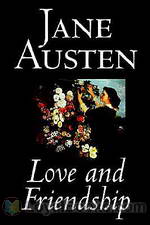 Love and Friendship
Love and Friendship
Begun when she was just eleven years old, Love and Friendship is one of Jane Austen's stories that very few readers may have encountered before. Austen experts feel that this story was written, like many others, only for the pleasure of her family and friends. It is scribbled across three notebooks, in childish handwriting, and the complete work is thought to have been written over a period of six or seven years. It is dedicated to one of her cousins, whom she was very close to, Eliza de Feuillide... | |
By: Mark Twain (1835-1910) | |
|---|---|
 The Adventures of Tom Sawyer
The Adventures of Tom Sawyer
If ever there was a story written based unabashedly on adventure and trouble, this is it. There are treasure hunts and murderers on the run in this book that will keep you spellbound. Tom and his half-brother, Sid, lived with their aunt, Polly. Tom was a boisterous young fellow who constantly found himself in rather awkward situations that landed him into trouble. These situations were however exceedingly hilarious. On one occasion, Tom dirtied his clothes in a fight and his punishment was to whitewash the fence the following day... | |
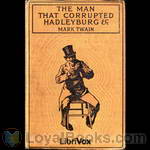 The Man That Corrupted Hadleyburg, and Other Stories
The Man That Corrupted Hadleyburg, and Other Stories
“The Man That Corrupted Hadleyburg” is a piece of short fiction by Mark Twain. It first appeared in Harper’s Monthly in December 1899, and was subsequently published by Harper Collins in the collection The Man That Corrupted Hadleyburg and Other Stories and Sketches (1900). This recording contains all the stories and sketches from the 1900 Harper Collins publication. | |
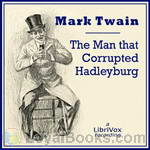 The Man That Corrupted Hadleyburg
The Man That Corrupted Hadleyburg
The town of Hadleyburg had the reputation of being the most honest town in a wide area, indeed an incorruptible community. The elders took this reputation so to heart that they brought up their children shielded from all temptation and trained thoroughly in total honesty. However, a stranger passing through the community was seriously offended by the actions of residents of this Utopia, and he vowed to gain revenge. After several years he came up with the perfect plan to embarrass the town and expose its hypocrisy. (Introduction by Leonard Wilson) | |
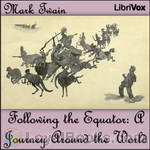 Following the Equator: A Journey Around the World
Following the Equator: A Journey Around the World
Following the Equator (American English title) or More Tramps Abroad (English title) is a non-fiction travelogue published by American author Mark Twain in 1897. Twain was practically bankrupt in 1894 due to a failed investment into a “revolutionary” typesetting machine. In an attempt to extricate himself from debt of $100,000 (equivalent of about $2 million in 2005) he undertook a tour of the British Empire in 1895, a route chosen to provide numerous opportunities for lectures in the English language... | |
 Mark Twain's (Burlesque) Autobiography and First Romance
Mark Twain's (Burlesque) Autobiography and First Romance
Mark Twain's (Burlesque) Autobiography and First Romance, a short volume, published by Sheldon & Co., NY in 1871, is Mark Twain's third book. It consists of two stories - First Romance, which had originally appeared in The Express in 1870, and A Burlesque Autobiography (bearing no relationship to Twain's actual life), which first appeared in Twain's Memoranda contributions to the Galaxy. Rather, the content consists of a few short stories of fictional characters who are supposedly part of Twain's lineage... | |
 Sketches New and Old
Sketches New and Old
This collection of 63 writings by Mark Twain was published in 1875. Among other sketches, it contains “The Jumping Frog” in the original English, followed by a French translation (read here by Caroline Sophie) which Twain re-translated into English, showing how the French translation of his work was “badly flawed.” In many of these sketches, Twain shows his talent for outrageous and hilarious inventiveness, often in reaction to current events. | |
 The American Claimant
The American Claimant
The American Claimant is an 1892 novel by American humorist and writer Mark Twain. The story focuses on the class differences and expectations of monarchic, hierarchical Britain and the upstart, "all men are created equal" America. Twain wrote the novel with the help of phonographic dictation, the first author (according to Twain himself) to do so. This was also (according to Twain) an attempt to write a book without mention of the weather, the first of its kind in fictitious literature. Indeed, all the weather is contained in an appendix, at the back of the book, which the reader is encouraged to turn to from time to time. | |
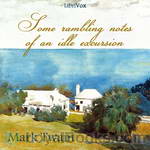 Some Rambling Notes of an Idle Excursion
Some Rambling Notes of an Idle Excursion
Written for the Atlantic magazine in 1877, this is a collection of stories about a trip Mark Twain made with some friends to Bermuda. It contains fascinating descriptions of Bermuda the island, and some of its people as well as an explanation of why Bermuda's houses are "so white". | |
 How to Tell a Story, and Other Essays
How to Tell a Story, and Other Essays
In his inimitable way, Mark Twain gives sound advice about how to tell a story, then lets us in on some curious incidents he experienced, and finishes with a trip that proves life-changing. | |
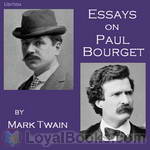 Essays on Paul Bourget
Essays on Paul Bourget
Collection of short essays concerning French novelist and critic Paul Bourget. Included: "What Paul Bourget Thinks of Us" and "A Little Note to M. Paul Bourget". | |
By: Charles Dickens (1812-1870) | |
|---|---|
 The Life and Adventures of Martin Chuzzlewit
The Life and Adventures of Martin Chuzzlewit
Dickens thought it was “in a hundred points, immeasurably the best” of his stories. Yet it was also one of his greatest flops. Compared to his other novels, The Life and Adventures of Martin Chuzzlewit was a dismal failure in terms of sales and the main reason for Dickens falling out with his long term publisher Chapman & Hall. They invoked a penalty clause and demanded that he pay back a portion of the advance which he refused. Martin Chuzzlewit was also dimly received in Dickens friendly America... | |
By: Jules Verne | |
|---|---|
 Doctor Ox's Experiment
Doctor Ox's Experiment
An early, light-hearted short story, published in 1872 by Jules Verne. It takes place in the Flemish town of Quiquendone, where life moves at an extraordinarily tranquil pace. Doctor Ox has offered to light the town with a new gas, but actually has other plans in place. | |
By: Robert Louis Stevenson | |
|---|---|
 The Wrong Box
The Wrong Box
The Wrong Box is a comedy about the ending of a tontine (a tontine is an arrangement whereby a number of young people subscribe to a fund which is then closed and invested until all but one of the subscribers have died. That last subscriber then receives the whole of the proceeds). The story involves the last two such survivors and their relations, a train crash, missing uncles, surplus dead bodies and innocent bystanders. A farce really. | |
By: L. Frank Baum | |
|---|---|
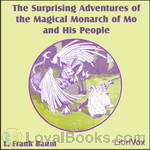 The Surprising Adventures of the Magical Monarch of Mo and His People
The Surprising Adventures of the Magical Monarch of Mo and His People
The Magical Monarch of Mo is a set of stories about the titular king, his queen, and his royal children. The stories are uproariously funny, dealing with topics as absurd as a man losing his temper who then tries to find it, an evil midget who steals a princess's big toe, and an entire city filled with highly civilized monkeys! Join the Monarch and all his friends for a rollicking adventure, filled with fun for the whole family! | |
By: H. G. Wells | |
|---|---|
 The Wheels of Chance
The Wheels of Chance
“The Wheels of Chance – A Bicycling Idyll” follows the adventures of a Drapers Assistant who, having brought an ancient bicycle, sets off on a 2 week tour of the countryside. He encounters a Lady in Grey wearing rationals (bloomers). And his world will never be the same again | |
By: Rudyard Kipling (1868-1936) | |
|---|---|
 Letters of Travel
Letters of Travel
| |
By: Miguel de Cervantes Saavedra (1547-1616) | |
|---|---|
 The Exemplary Novels of Miguel de Cervantes Saavedra
The Exemplary Novels of Miguel de Cervantes Saavedra
Originally compiled by Cervantes himself in 1613 as a collection of "exemplary" stories, this translated version from 1881 brings these stories to the English reader. Included in the collection are twelve stories selected by Cervantes, including "A Deceitful Marriage," which famously transitions seamlessly and humorously into the "Dialogue Between Scipio and Berganze". | |
By: Alexandre Dumas (1802-1870) | |
|---|---|
 The Vicomte De Bragelonne
The Vicomte De Bragelonne
After The Three Muskateers and Twenty Years After the adventurous story of Athos, Porthos, Aramis and D'Artagnan continues!The Vicomte of Bragelonne: Ten Years Later (French: Le Vicomte de Bragelonne ou Dix ans plus tard) is the last of the Musketeer novels. It is usually divided into four volumes and this first volume contains chapters 1-75. | |
By: Oscar Wilde (1854-1900) | |
|---|---|
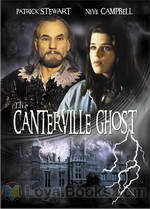 The Canterville Ghost
The Canterville Ghost
An American diplomat's family moves into an ancient stately mansion. They're warned by the owner that it is haunted by a most horrifying and gruesome spirit who had once cruelly murdered his own wife. The story progresses with creaking floor boards, mysterious passages, dark attics, clanking chains, and weird howling. Yet, the reader is totally unprepared for Oscar Wilde's brand of tongue in cheek humor as he takes all the ingredients of a traditional ghost story and turns it on its head, and creates a hilarious parody instead of a morbid saga! The Canterville Ghost was the first of Oscar Wilde's short stories to be published... | |
By: Herman Melville (1819-1891) | |
|---|---|
 The Encantadas, Or Enchanted Isles
The Encantadas, Or Enchanted Isles
The Encantadas or Enchanted Isles is a novella by American author Herman Melville. First published in Putnam's Magazine in 1854, it consists of ten philosophical "Sketches" on the Encantadas, or Galápagos Islands. It was collected in The Piazza Tales in 1856. The Encantadas was to become the most critically successful of that collection. All of the stories are replete with symbolism reinforcing the cruelty of life on the Encantadas. (Introduction excerpted from Wikipedia) | |
By: G. K. Chesterton | |
|---|---|
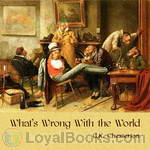 What's Wrong With the World
What's Wrong With the World
Gilbert Keith Chesterton (1874–1936) has been called the “prince of paradox.” Time magazine observed of his writing style: “Whenever possible Chesterton made his points with popular sayings, proverbs, allegories—first carefully turning them inside out.” His prolific and diverse output included journalism, philosophy, poetry, biography, Christian apologetics, fantasy and detective fiction. The title of Chesteron’s 1910 collection of essays was inspired by a title given to him two years earlier by The Times newspaper, which had asked a number of authors to write on the topic: “What’s wrong with the world?”... | |
 The Defendant
The Defendant
A collection of reprinted articles on a wide-range of subject, all in the unique style of G. K. Chesterton. Using wit, paradox, and good humor he “defends” a series of seeming harmless things that need no defense, and in so doing he exposes many of the broken assumptions and dogmatic notions of secular humanism and other trends of his age and of ours. | |
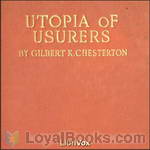 A Utopia of Usurers
A Utopia of Usurers
“Now I have said again and again (and I shall continue to say again and again on all the most inappropriate occasions) that we must hit Capitalism, and hit it hard, for the plain and definite reason that it is growing stronger. Most of the excuses which serve the capitalists as masks are, of course, the excuses of hypocrites. They lie when they claim philanthropy; they no more feel any particular love of men than Albu felt an affection for Chinamen. They lie when they say they have reached their position through their own organising ability... | |
By: P. G. Wodehouse (1881-1975) | |
|---|---|
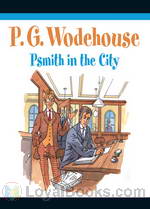 Psmith in the City
Psmith in the City
Mike’s dream of studying and playing cricket at Cambridge are thwarted as his father runs into financial difficulties. Instead, Mike takes on the job of clerk at the “New Asiatic Bank.” Luckily, school friend Psmith, with his boundless optimism and original views, soon joins his department, and together they endeavour to make the best of their new life in London. | |
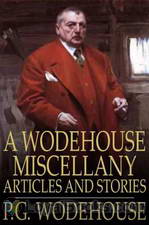 A Wodehouse Miscellany; Articles and Stories
A Wodehouse Miscellany; Articles and Stories
Sir Pelham Grenville Wodehouse was an English comic writer who enjoyed enormous popular success for more than seventy years. Best known today for the Jeeves and Blanding Castle novels and short stories, Wodehouse was also a talented playwright and lyricist who was part author and writer of fifteen plays and of 250 lyrics for some thirty musical comedies. | |
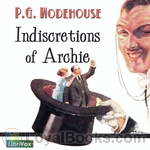 Indiscretions of Archie
Indiscretions of Archie
It wasn’t Archie’s fault really. It’s true he went to America and fell in love with Lucille, the daughter of a millionaire hotel proprietor and if he did marry her–well, what else was there to do?From his point of view, the whole thing was a thoroughly good egg; but Mr. Brewster, his father-in-law, thought differently, Archie had neither money nor occupation, which was distasteful in the eyes of the industrious Mr. Brewster; but the real bar was the fact that he had once adversely criticised one of his hotels... | |
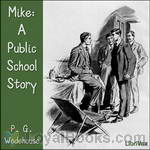 Mike: A Public School Story
Mike: A Public School Story
This novel introduces the characters Mike Jackson and Psmith, who are featured in several of Wodehouse’s later works. It shows how the two characters first met each other as teenagers at boarding school. As Psmith doesn’t appear until about halfway through this book, it was later released as two separate books, Mike at Wrykyn and Mike and Psmith. There’s lots of cricket, but you don’t need to understand the game to enjoy the antics of these public school boys as they "rag" each other and the authorities. | |
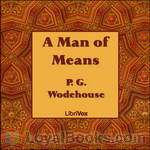 A Man of Means
A Man of Means
A Man of Means is a collection of six short stories written in collaboration by P. G. Wodehouse and C. H. Bovill. The stories all star Roland Bleke, a nondescript young man to whom financial success comes through a series of “lucky” chances, the first from a win in a sweepstake he had forgotten entering. Roland, like many a timid young man seeks love and marriage. In this pursuit his wealth is regularly a mixed blessing. The plot of each story follows its predecessor, sometimes directly, and occasionally refer back to past events in Bleke’s meteoric career... | |
 Selected Short Stories
Selected Short Stories
"A miscellaneous collection of short stories, not featuring any of Wodehouse's regular characters, most concern love and romance and, being Wodehouse, all are amusing." | |
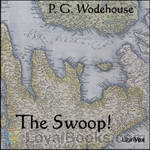 The Swoop!
The Swoop!
The Swoop! tells of the simultaneous invasion of England by several armies — “England was not merely beneath the heel of the invader. It was beneath the heels of nine invaders. There was barely standing-room.” (ch. 1) — and features references to many well-known figures of the day, among them the politician Herbert Gladstone, novelist Edgar Wallace, actor-managers Seymour Hicks and George Edwardes, and boxer Bob Fitzsimmons. | |
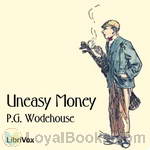 Uneasy Money
Uneasy Money
Uneasy Money is a romantic comedy by P.G. Wodehouse, published during the First World War, it offers light escapism. More romantic but only a little less humorous that his mature works, it tells of the vicissitudes of poor Lord Dawlish, who inherits five million dollars, but becomes a serially disappointed groom. When the story opens Bill (Lord Dawlish, a thoroughly pleasant man) is engaged to a demanding actress. His first thought when hearing of his massive legacy from a stranger whose tendency to slice he once cured on a West Country golf course is of the disappointed relatives... | |
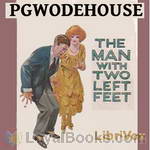 The Man With Two Left Feet, and Other Stories
The Man With Two Left Feet, and Other Stories
The Man With Two Left Feet, and Other Stories is a collection of short stories by P. G. Wodehouse, first published in the United Kingdom on March 8, 1917 by Methuen & Co., London, and in the United States in 1933 by A.L. Burt and Co., New York. All the stories had previously appeared in periodicals, usually the Strand in the UK and the Red Book magazine or the Saturday Evening Post in the US. It is a fairly miscellaneous collection — most of the stories concern relationships, sports and household... | |
 Not George Washington
Not George Washington
It has been said that behind every successful man is a good woman. This is certainly true in the case of James Orlebar Cloyster. However, some funny things happened on his road to success. His story is humorously told from the point of view of several parties involved.According to Wikipedia, the book is a humorous, fictionalized account of Wodehouse's early years as a journalist, with Wodehouse being portrayed by the character of Cloyster. | |
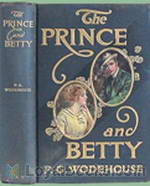 The Prince and Betty
The Prince and Betty
The Prince and Betty is a novel by P. G. Wodehouse. It was originally published in Ainslee's Magazine in the United States in January 1912, and, in a slightly different form, as a serial in Strand Magazine in the United Kingdom between February and April 1912, before being published in book form, in the UK only, by Mills & Boon, London, on 1 May that year. A substantially different version, which incorporated the plot of Psmith, Journalist, was published in the US by W. J. Watt, New York on 14 February 1912, and is the only version now widely available... | |
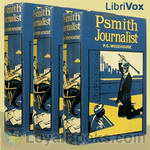 Psmith, Journalist
Psmith, Journalist
Psmith takes over editing a paper while the usual editor is away on vacation. He takes on a local slum lord, and divers alarums ensue. (description by Psuke Bariah) | |
By: Eleanor H. Porter (1868-1920) | |
|---|---|
 Oh, Money! Money!
Oh, Money! Money!
Mr. Stanley Fulton is worth millions, but he has no one to leave his money to except some unknown distant cousins. In order to find out how they would handle a fortune, he decides to give each of them $100,000 dollars during his life, and go – incognito - to live in their midst! Who will prove worthy to inherit his millions and will his deception be discovered?Eleanor H. Porter was an early 20th century author of children’s literature and novels. Her most well known book was “Pollyanna” and it’s sequel, “Pollyanna Grows Up”. | |
By: Edgar Allan Poe | |
|---|---|
 Two Poe Tales
Two Poe Tales
Edgar Allan Poe is best known for his famous short horror stories; however, horror is not the only genre in which he wrote. How To Write a Blackwood Article and its companion piece A Predicament are satirical works exploring the pieces of the formula generally seen in short horror stories (”articles”) found in the Scottish periodical “Blackwood’s Magazine” and the successful misapplication of said formula by – horrors! – a woman author! – respectively. | |
By: Stephen Leacock (1869-1944) | |
|---|---|
 Frenzied Fiction
Frenzied Fiction
From the cave man to Santa Claus; spies, know-it-alls, and journalists: all are fair game for Leacock’s special brand of humor. He touches on the changes time has brought about in the city, education, and work habits. Among the other topics in this work are nature, fishing, gardening, success, and spirits–both of the departed and of the variety Prohibition prohibited. Each chapter of this book is a standalone story and if you love a good laugh, these stories are for you. In me, Leacock’s wit produced the full range of laughter: smiles, chuckles, guffaws, and some uncontrollable giggles. Also, occasionally, I found myself shedding a tear or two. (Review by Debra Lynn) | |
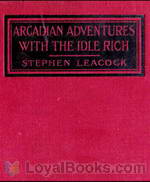 Arcadian Adventures with the Idle Rich
Arcadian Adventures with the Idle Rich
“Arcadian Adventures with the Idle Rich” is a work of humorous fiction by Stephen Leacock first published in 1914. It is the follow-up to his 1912 classic “Sunshine Sketches of a Little Town.” Like that work, it is a sequence of interlocking stories set in one town, but instead of focusing on a small Canadian town in the countryside, it is set in a major American metropolis and its characters are the upper crust of society. Although currently not as well-known as the earlier book, “Arcadian Adventures” was extremely popular in North America at the time of its publication and for a while was considered the greater success... | |
 Winsome Winnie and other New Nonsense Novels
Winsome Winnie and other New Nonsense Novels
Eight silly stories by Canadian humourist Stephen Leacock. | |
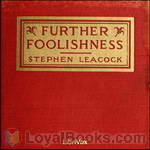 Further Foolishness
Further Foolishness
Seventeen goofy stories and essays by Canadian humourist Stephen Leacock. "Professor Leacock has made more people laugh with the written word than any other living author. One may say he is one of the greatest jesters, the greatest humorist of the age." – A. P. Herbert (Introduction by TriciaG & Wikipedia) | |
 Literary Lapses
Literary Lapses
Short sketches relating the humourous side of life in 1910. "Professor Leacock has made more people laugh with the written word than any other living author. One may say he is one of the greatest jesters, the greatest humorist of the age." – A. P. Herbert | |
 The Hohenzollerns in America
The Hohenzollerns in America
More stories by Canadian Stephen Leacock. Some of these stories carry over characters introduced in Further Foolishness. Some stories are humourous; some are more thoughtful. It helps to be familiar with WWI-era European politics to catch much of the humour. Full title: The Hohenzollerns in America With the Bolsheviks in Berlin and Other Impossibilities | |
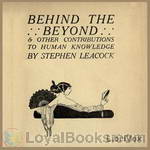 Behind the Beyond
Behind the Beyond
A collection containing a parody on Problem Plays, as well as humorous anecdotes from Canadian humourist Stephen Leacock. | |
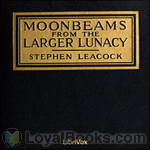 Moonbeams from the Larger Lunacy
Moonbeams from the Larger Lunacy
Humorous, ironic, and sometimes cynical observations of life in 1915 from Canadian humourist Stephen Leacock. | |
By: F. Scott Fitzgerald | |
|---|---|
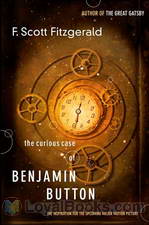 The Curious Case of Benjamin Button
The Curious Case of Benjamin Button
A life lived backwards, with events happening in reverse order forms the strange and unexpected framework of one of F Scott Fitzgerald's rare short stories. The Curious Case of Benjamin Button was published in Collier's in 1927 and the idea came to Fitzgerald apparently from a quote of Mark Twain's in which he regretted that the best part of life came at the beginning and the worst at the end. Fitzgerald's concept of using this notion and turning the normal sequence of life on its head resulted in this delightful, thought provoking fantasy tale... | |
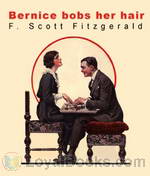 Bernice Bobs Her Hair
Bernice Bobs Her Hair
Pretty but socially clueless Bernice lets her know-it-all cousin push her around, but eventually, something's gotta give! (Introduction by BellonaTimes) | |
By: Henry James (1843-1916) | |
|---|---|
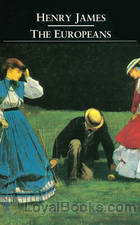 The Europeans
The Europeans
The Europeans: A sketch is a short novel by Henry James, published in 1878. It is essentially a comedy contrasting the behaviour and attitudes of two visitors from Europe with those of their relatives living in the ‘new’ world of New England. The novel first appeared as a serial in The Atlantic Monthly for July-October, 1878. James made numerous minor revisions for the first book publication. | |
By: Jonathan Swift (1667-1745) | |
|---|---|
 A Modest Proposal
A Modest Proposal
A satirical essay written by one of the most renowned satirists, Jonathan Swift, A Modest Proposal expresses the author’s exasperation with the ill treatment of impoverished Irish citizens as a result of English exploitation and social inertia. Furthermore, Swift ventilates the severity of Ireland’s political incompetence, the tyrannical English policies, the callous attitudes of the wealthy, and the destitution faced by the Irish people. Focusing on numerous aspects of society including government exploitation, reckless greed, hypocrisy, apathy, and prejudice, the essay successfully exemplifies Swift’s satirical skills... | |
By: Anthony Trollope (1815-1882) | |
|---|---|
 Miss Mackenzie
Miss Mackenzie
The thirty-five year-old (hence utterly over-the-hill) Miss Margaret Mackenzie, having devoted her life to others, suddenly finds herself with no one to care for, and in possession of a moderate fortune. Having money, she is now much sought-after and no longer universally deemed too old to marry. Partly because she has spent her life taking care of the brother whose money she has now inherited, she has no experience of wealth or popularity. Miss Mackenzie is the definition of “other-oriented. (Indeed, Trollope originally considered naming the novel, and his heroine, “Griselda”, presumably to invoke the folkloric character’s qualities of stolid obedience and endless patience... | |
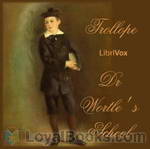 Doctor Wortle's School
Doctor Wortle's School
Anthony Trollope’s fortieth novel, published in 1881, concerns a respectable Christian boys’ school whose proprietor unknowingly hires a woman who apparently has two husbands: A devoted English scholar and an abusive drunkard from the American south. The book interweaves a sensitive and realistic exploration of Dr. Wortle’s moral dilemma with a humorous look at small-town gossip and--of course--a romance involving the doctor’s beautiful young daughter. ( | |
 Is He Popenjoy ?
Is He Popenjoy ?
Trollope returns in Is He Popenjoy to two of his favorite subjects: property and inheritance. As in "Doctor Thorne," the issues are complicated by the specter of possible illegitimacy. Lord George Germain, a thoroughly respectable, upstanding, if not particularly bright younger son with new wife, rather expects to inherit a title, since his vicious and dissolute elder brother, the Marquis of Brotherton, who lives in Italy, shows no signs of settling down and producing heirs. Then comes a thunderbolt in the form of a letter from the Marquis suddenly claiming that he has, late in life, married an Italian widow and sired a son... | |
 Struggles of Brown, Jones, and Robinson
Struggles of Brown, Jones, and Robinson
Billed as a satire concerning the dishonest advertising and business practices of the day, it tells the tale of an upstart clothing business doomed from the get-go to utter failure. Its senior partner (the elderly Brown, who provides the investment) is far too timid for business. His son-in-law (Jones, who runs the store) is stealing from the till, and the junior partner, Robinson (who writes advertisements for the store) is so obsessed with the idea that advertising alone will drive the business, he uses up every last penny of the capital investment in a series of increasingly ludicrous ad campaigns and publicity stunts... | |
By: Edward M. Forster (1879-1970) | |
|---|---|
 Where Angels Fear to Tread
Where Angels Fear to Tread
On a journey to Tuscany with her young friend and traveling companion Caroline Abbott, widowed Lilia Herriton falls in love with both Italy and a handsome Italian much younger than herself, and decides to stay. Furious, her dead husband’s family send Lilia’s brother-in-law to Italy to prevent a misalliance, but he arrives too late. Lilia marries the Italian and in due course becomes pregnant again. When she dies giving birth to her child, the Herritons consider it both their right and their duty to travel to Monteriano to obtain custody of the infant so that he can be raised as an Englishman. | |
By: Jerome K. Jerome (1859-1927) | |
|---|---|
 Told after Supper
Told after Supper
It is Christmas Eve, and the narrator, his uncle and sundry other local characters are sitting round the fire drinking copious quantities of whisky punch and telling ghost stories until bedtime, when… But no, I won’t spoil the fun. This is a little gem: Jerome at his tongue-in-cheek best. | |
 Stage Land
Stage Land
A comic look at the curious habits and customs of the inhabitants of ‘Stage Land’. Dedicated to ‘that highly respectable but unnecessarily retiring individual, of whom we hear so much but see so little, “the earnest student of drama” | |
 They and I
They and I
A man and his three children leave the “Little Mother” at home in the city and set up temporary housekeeping in a country cottage to supervise the remodeling of the house he has just purchased there. The story is narrated by the father. His interactions with his children, interspersed with his own recollections of past events, make for hilarious reading. This is Jerome at his best, IMHO, although this is apparently one of this lesser known novels. | |
 Idle Ideas in 1905
Idle Ideas in 1905
Back in 1905 Jerome K. Jerome shared his thoughts on a variety of subjects, including "Should Women Be Beautiful?", "Should Soldiers Be Polite?" and "Is The American Husband Made Entirely Of Stained Glass?". Every subject is analysed and commented on in the witty and satirical style we have grown to expect from the author. | |
By: Arnold Bennett (1867-1931) | |
|---|---|
 The Regent
The Regent
'The Regent' is, if not a sequel to 'The Card', then a 'Further Adventures of' the eponymous hero of that novel.Denry Machin is now forty-three and begins to feel that he is getting old, that making money and a happy home life are not enough and that he has lost his touch as the entrepreneur and entertainer of the 'Five Towns'.In fact, as he says to himself 'What I want is change - and a lot of it too!'. A chance meeting at the local theatre leads to his going to London and then... | |